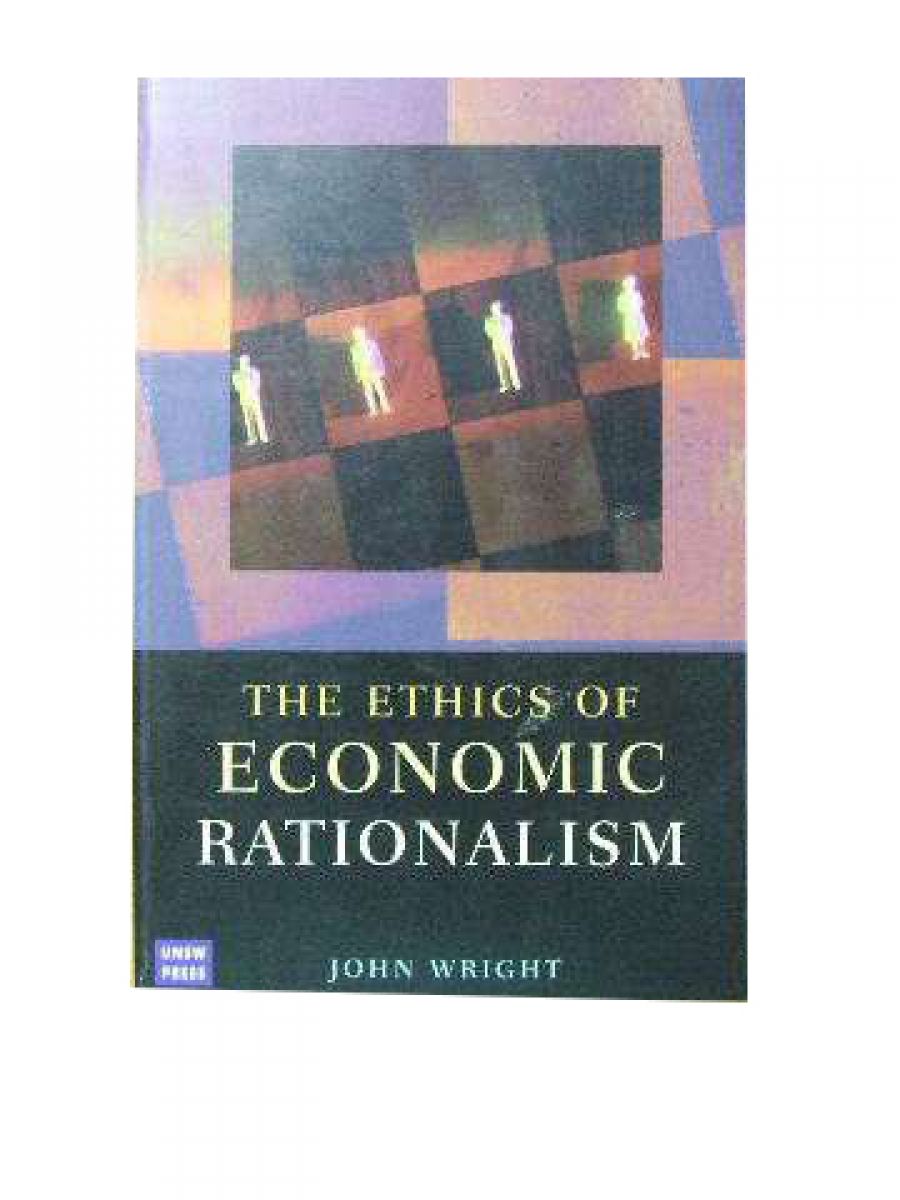
- Free Article: No
- Contents Category: Economics
- Review Article: Yes
- Article Title: Crying out for Integrity
- Online Only: No
- Custom Highlight Text:
Michael Pusey coined the term ‘economic rationalism’ in 1991 to refer to the narrow economic focus of many senior public servants in Canberra. These influential advisers were mostly classically trained economists who saw their task as being to assist in creating a more efficient and productive society by privatising publicly owned utilities and services, giving greater rein to market forces, increasing competition, deregulating the labour market, and so on. But like every major political programme, economic rationalism has had, and continues to have, great social costs. John Wright’s book is primarily a moral evaluation of this programme.
- Book 1 Title: The Ethics of Economic Rationalism
- Book 1 Biblio: UNSW Press, $34.95 pb, 224 pp
- Book 1 Cover Small (400 x 600):

- Book 1 Cover (800 x 1200):

In Part I, Wright presents the economic case for economic rationalism. He does so clearly, simply and forcefully, in lay-man’s language and with enough detail to satisfy even the most austere economic rationalist that he knows what he is talking about. So, after reading these chapters, those who are drawn to economic rationalism are likely to find themselves looking forward to the ethical discussion that follows in Part II. Indeed, they should be looking forward to it, because Wright’s examination of the ethical case for economic rationalism maintains the high standard of fair and honest discussion evident in Part I. But Wright’s conclusions are far less likely to please the committed economic rationalist, for Wright systematically dismantles the most common moral arguments for economic rationalism. Those who think that the programme of economic reform is well justified morally if it can be shown that it will maximise economic efficiency, or that economic growth is worth pursuing whatever the consequences, will be forced to think again. Those who have more sophisticated arguments in favour of the neo-liberal agenda will be forced to reconsider them.
The more sophisticated arguments in favour of economic rationalism include those that have been championed by some of the biggest names in economic and political theory: Robert Nozick, Milton Friedman and Friedrich von Hayek. In the style to which we have by now become accustomed, Wright presents their arguments clearly and forcefully, without any rhetorical flourishes to indicate his doubts about their premises or conclusions, before proceeding to take them apart. He does this modestly, and without overstating the force of his own conclusions.
Yet, I fear that Wright’s book will not be as influential as it should be. As an exercise in rational evaluation, it is very good. But I cannot see it being read widely by the zealots in either camp. Critics of economic rationalism will think that the book lacks punch. It fails to condemn economic rationalism as a morally corrupt programme designed to transfer income or resources from the poor, or to enrich those who are already rich. In Wright’s view, economic rationalists are not conspirators with any such evil intentions. They are just people who are mistaken in thinking that the economic reform programme that they support will make our society a better place. They are, for the most part, people who have been led astray by the narrow economic focus of their thinking.
Supporters of economic rationalism will think that Wright’s book poses no threat to their position. They are unlikely to be moved by it, even if they take the trouble to read it all the way through. For the issue is now seen as political, rather than economic or moral, and politics are seen as being about winning. Wright’s book is not a political tract. It contains few quotable quotes. It won’t galvanise the troops in the coming political battle with the economic rationalists in Canberra, or elsewhere. So, they will say, it can safely be ignored. There are no votes in it.
This is a pity. Rational debate about important issues is sorely needed in Australia today. But neither the government nor the opposition parties can see much point in it. The government has won and consolidated power by raising people’s fears of being swamped by boatloads of uncouth Muslims from the Middle East, and by masquerading as the gallant defender of the nation against these barbarian invaders. The Labor Party has gone along with this charade, evidently believing that truth, rationality and morality are of no consequence in this debate. They know, or at least believe, that, if they were to try to engage with the government on any such grounds, they would lose.
This may well be the case on the issue of asylum seekers, although I sense that public sentiment is shifting. But if Pusey himself is to be believed, public attitudes to economic rationalism are now becoming very negative. In his latest book, The Experience of Middle Australia (2003), Pusey demonstrates that a great many people whose incomes are in the middle eighty per cent of the range are angry and disillusioned. Economic rationalism is seen as having produced a seismic shift in income, power and resources from: the public sector to the private sector; the bottom seventy per cent of wage and salary earners to the top ten per cent; wage and salary earners to corporations; small business to big business; the ‘bush’ to the city; consumers to producers; and households to the market.
Consequently, I am not at all sure that an opposition that seriously challenged the government’s economic reform programme on moral grounds would be defeated. My impression is that the nation is crying out for some moral integrity.


Comments powered by CComment